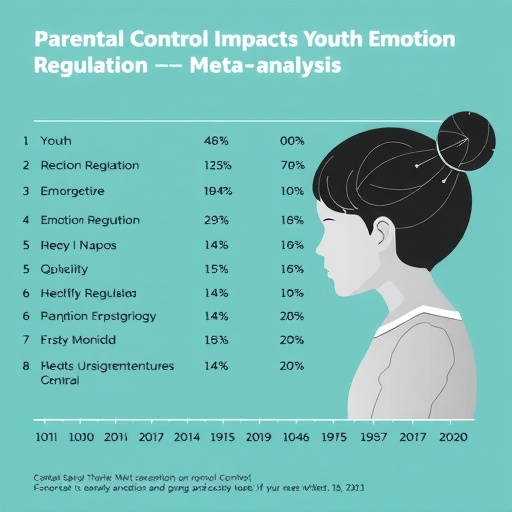The intricate dynamics of parental influence on a child’s emotional development have been a focal point of psychological research for many years. In a groundbreaking study published in the Journal of Child and Family Studies, a team of researchers led by L.E. Beliveau, AM.R. Iselin, and J. DeCoster have conducted a comprehensive meta-analysis examining the relationship between parental psychological control and emotion regulation in youth. This research represents a significant contribution to the understanding of how different parenting styles can impact children’s emotional resilience and overall psychological health.
Parental psychological control is defined as a form of parenting that involves manipulative strategies such as guilt-tripping, shaming, or invalidating children’s emotions. These tactics often impede children’s ability to develop autonomy and self-regulation. Distinct from behavioral control, which focuses on regulating children’s actions, psychological control infiltrates their emotional landscape, potentially leading to long-term detrimental effects on their emotional well-being. With increasing instances of emotional and behavioral problems among youth, understanding these subtleties in parenting styles has never been more critical.
The comprehensive meta-analysis consolidates data from multiple studies involving thousands of participants, allowing the researchers to draw overarching conclusions about the impacts of parental control on emotional outcomes. In analyzing such extensive data, the authors employed rigorous statistical techniques to ensure that the findings were not only reliable but also generalizable across various contexts and populations. This depth of analysis strengthens the case for recognizing parental psychological control as a key factor in emotional development.
One of the most striking outcomes of the study is the clear link established between high levels of parental psychological control and poorer emotion regulation skills among youth. Children subjected to these manipulative parenting practices showed elevated levels of anxiety and depression, and struggled significantly with managing their emotions effectively. Such findings prompt a reevaluation of common parenting practices that may seem benign on the surface but can have profound implications for their children’s emotional health.
Moreover, the researchers discovered variations in how different demographic factors might affect this relationship. For example, the degree to which psychological control influenced emotion regulation varied across age groups, with older children exhibiting stronger correlations between parental control and their emotional outcomes. This suggests that the developmental stage at which children are exposed to specific parental strategies may significantly magnify or mitigate the potential negative consequences of psychological control.
Additionally, the study provides compelling evidence for the role of resilience in moderating the effects of parental psychological control. Those children who exhibited higher levels of resilience were found to be less adversely affected by psychological control, indicating that fostering resilience could serve as a protective factor. This is particularly pertinent for parents and educators who aim to cultivate grit and resilience in youth, providing them with tools to combat negative influences.
The implications of these findings extend beyond academic circles; they resonate strongly in practical settings such as schools and counseling environments. Mental health professionals can use this research to inform their therapeutic practices, encouraging caregivers to adopt more autonomy-supportive parenting styles that promote emotional competence in their children. Such strategies may involve encouraging open communication, validation of feelings, and fostering independent decision-making, all of which contribute to healthier emotional development.
Interestingly, the study also highlights the potential transgenerational consequences of psychological control. If left unaddressed, children raised with high psychological control may replicate these patterns as parents themselves, perpetuating a cycle of emotional dysregulation. This cyclical nature poses a challenge for intervention, as addressing these patterns necessitates systemic changes in how future caregivers are educated about effective parenting practices.
Furthermore, the researchers emphasize the importance of societal awareness surrounding the concept of psychological control. Community programs aimed at educating parents and caretakers about healthy emotional expression, as well as recognizing detrimental manipulation techniques, could foster environments conducive to emotional well-being. Initiatives that provide resources and support for parents to better understand the impacts of their control tactics can pave the way for healthier generational patterns.
In conclusion, Beliveau and colleagues’ extensive meta-analysis provides a vital lens through which to examine the impact of parental psychological control on child development. Their findings challenge the notion of one-size-fits-all parenting, advocating for an approach that emphasizes emotional intelligence and respectful communication. The importance of these insights cannot be understated, particularly as families navigate increasingly complex emotional landscapes in contemporary society.
As the conversation around mental health continues to gain traction, studies like this underscore the critical roles that caregivers play in shaping their children’s emotional destinies. By prioritizing healthy, supportive parenting strategies, society can cultivate emotionally resilient generations capable of facing future challenges with greater competence and confidence.
In light of the findings from this meta-analysis, it is imperative that we reconsider the frameworks through which we understand family dynamics and emotional development. With action based on research, better pathways can be created for the next generation, ultimately breaking the cycle of emotional turmoil rooted in detrimental parenting practices.
Subject of Research: The relationship between parental psychological control and emotion regulation in youth.
Article Title: Author Correction: A Meta-analysis Relating Parental Psychological Control with Emotion Regulation in Youth.
Article References: Beliveau, L.E., Iselin, A.M.R., DeCoster, J. et al. Author Correction: A Meta-analysis Relating Parental Psychological Control with Emotion Regulation in Youth. J Child Fam Stud (2025). https://doi.org/10.1007/s10826-025-03180-2
Image Credits: AI Generated
DOI: 10.1007/s10826-025-03180-2
Keywords: parental psychological control, emotion regulation, youth, mental health, resilience, parenting strategies, emotional development.




